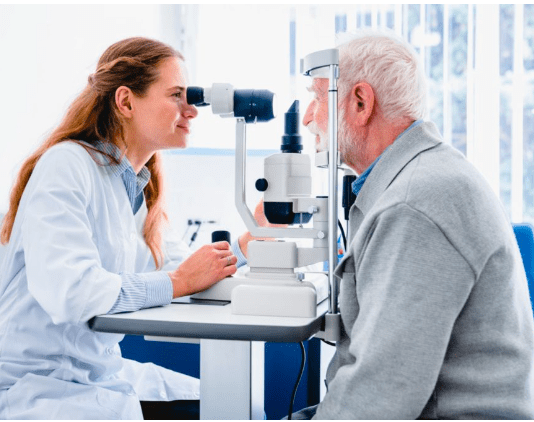Health
Unlocking the Secrets: Can Eye Diseases Be Cured?

Unlocking the Secrets: Can Eye Diseases Be Cured?
In the realm of health and well-being, our eyes are undeniably precious gems. The intricate structures that enable us to perceive the world are intricate, delicate, and often vulnerable. But can eye diseases be cured? It’s a question that looms large for those battling ocular conditions and seeking answers.
In this comprehensive guide, we’ll delve deep into the world of eye health, exploring the possibilities, advancements, and potential treatments available. By the time you finish reading, you’ll have a clearer perspective on the state of eye disease treatments and their prospects.
Understanding Eye Diseases
Before we plunge into the prospects of curing eye diseases, it’s essential to grasp the diversity and complexity of these conditions. Eye diseases encompass a wide range of disorders, from the more common to the rare and debilitating. Some of the key eye diseases include:
- Cataracts: A clouding of the eye’s lens.
- Glaucoma: Characterized by increased pressure within the eye.
- Age-related Macular Degeneration (AMD): A leading cause of vision loss.
- Diabetic Retinopathy: A complication of diabetes affecting the retina.
- Retinitis Pigmentosa: A group of genetic disorders leading to vision loss.
Can Eye Diseases Be Cured? The Current Landscape
The journey to finding cures for eye diseases is an ongoing and dynamic one. Medical science has made significant strides, and while not all eye conditions can be completely cured, some can be managed effectively.
1. Cataracts: The Lens of Clarity
Cataracts, which cloud the lens, can indeed be cured. A common surgical procedure involves removing the cloudy lens and replacing it with an artificial one. The results are often astounding, with patients experiencing a remarkable improvement in their vision.
2. Glaucoma: Managing the Pressure
While there’s no outright cure for glaucoma, it can be managed effectively. Eye drops, medications, and surgical procedures can help lower intraocular pressure and halt the progression of the disease.
3. Age-related Macular Degeneration (AMD): Hope on the Horizon
AMD doesn’t have a complete cure yet, but research into new treatments like anti-VEGF therapy is promising. These treatments can slow the progression of the disease and help maintain better vision.
4. Diabetic Retinopathy: Managing Diabetes for Eye Health
Preventing diabetic retinopathy starts with effective diabetes management. While there’s no magic cure, early intervention and laser treatment can help prevent vision loss.
5. Retinitis Pigmentosa: Unlocking Genetic Secrets
Retinitis pigmentosa is a genetic condition, making it more challenging to cure. However, gene therapies and retinal implants show promise in improving vision for those affected.
The Role of Advanced Technology
Cutting-edge technology plays a pivotal role in the ongoing quest to cure eye diseases. Innovations like gene therapy, stem cell research, and artificial retinas are paving the way for new treatments and potential cures.
Frequently Asked Questions (FAQs)
1. Are all eye diseases curable?
Not all eye diseases are curable, but many can be managed effectively, preserving or improving vision.
2. Can cataracts be completely cured?
Yes, cataracts can be cured through surgical procedures that replace the cloudy lens with an artificial one.
3. Is there a cure for glaucoma?
While glaucoma can’t be completely cured, it can be managed with medications and surgical interventions to control intraocular pressure.
4. What’s the latest breakthrough in treating AMD?
Anti-VEGF therapy is a promising advancement for managing age-related macular degeneration.
5. Can diabetic retinopathy be reversed?
Diabetic retinopathy can’t be reversed, but early intervention and laser treatment can prevent further damage.
6. How can gene therapy help in treating retinitis pigmentosa?
Gene therapy holds the potential to improve vision in individuals with retinitis pigmentosa by targeting the underlying genetic causes.
7. What role do lifestyle choices play in maintaining eye health?
A healthy lifestyle, including a balanced diet, regular exercise, and protection from harmful UV rays, can contribute to maintaining good eye health.
Please note that while significant strides have been made in the field of eye disease treatment, it’s important to consult with a qualified healthcare professional for personalized advice and care.
Conclusion
In the ever-evolving landscape of eye disease treatments, hope shines brighter than ever before. While not all eye diseases can be completely cured, remarkable advancements in medical science provide solutions, hope, and improved quality of life for those affected.
Now, you’re better equipped to understand the possibilities and limitations of curing eye diseases. Stay informed, consult with healthcare professionals, and explore the latest developments in the field to ensure the best outcomes for your eye health.
Health
7 Fascinating Facts About Magnesium You Probably Didn’t Know

7 Fascinating Facts About Magnesium You Probably Didn’t Know
Magnesium is one of the most essential minerals for our health, yet many people are unaware of its significance.
This vital nutrient plays a crucial role in numerous bodily functions, from energy production to maintaining a healthy heart.
In this article, we will delve into seven intriguing facts about magnesium that may surprise you and help you appreciate its importance in your daily life.
What is Magnesium?
Magnesium is a naturally occurring mineral found in various foods and is vital for human health.
It is the fourth most abundant mineral in the body and is involved in over 300 biochemical reactions.
Magnesium contributes to nerve function, muscle contraction, blood sugar control, and blood pressure regulation.
It can be obtained from various dietary sources, including leafy greens, nuts, seeds, whole grains, and legumes.
1. Magnesium is Involved in Energy Production
Did you know that magnesium is essential for converting food into energy? This mineral plays a critical role in the activation of ATP (adenosine triphosphate), the energy currency of our cells.
Without sufficient magnesium, your body struggles to produce energy effectively, which can lead to feelings of fatigue and weakness.
How Does It Work?
ATP production occurs in the mitochondria, often referred to as the powerhouse of the cell.
Magnesium helps activate enzymes involved in this energy production process, ensuring that your body has enough energy to perform daily activities.
2. A Key Player in Bone Health
Magnesium is vital for maintaining strong and healthy bones. Approximately 60% of the magnesium in your body is stored in your bones.
It contributes to bone density and strength by regulating calcium levels in the body, which is crucial for bone formation.
The Calcium Connection
Calcium is often touted as the primary mineral for bone health, but magnesium plays an equally important role.
An imbalance of these two minerals can lead to bone-related issues such as osteoporosis.
Ensuring adequate magnesium intake is essential for maintaining optimal bone health.
3. Supports Heart Health
Magnesium is a crucial mineral for cardiovascular health. It helps maintain normal heart rhythms and can reduce the risk of heart disease.
Adequate magnesium levels are associated with lower blood pressure and reduced risk of heart attacks.
Regulation of Blood Pressure
Magnesium helps relax blood vessels, which can lead to lower blood pressure.
Studies have shown that individuals with higher magnesium intake tend to have better cardiovascular health. Including magnesium-rich foods in your diet can be an effective strategy for supporting heart health.
4. Magnesium and Mental Health
Emerging research suggests a strong link between magnesium levels and mental health.
Magnesium plays a role in regulating neurotransmitters, which are essential for mood stabilization.
Low magnesium levels have been associated with an increased risk of depression and anxiety.
Cognitive Function
Magnesium may also enhance cognitive function. Studies have indicated that adequate magnesium intake can improve memory and learning abilities.
This mineral is essential for brain health, making it vital for overall mental well-being.
5. Magnesium Deficiency is Common
Despite its importance, magnesium deficiency is surprisingly common.
Factors such as poor diet, chronic stress, and certain medical conditions can lead to low magnesium levels.
Symptoms of magnesium deficiency can include muscle cramps, fatigue, and irritability.
Risk Factors for Deficiency
Certain populations are at a higher risk for magnesium deficiency, including the elderly, those with gastrointestinal diseases, and individuals who consume a diet low in whole foods.
It’s essential to recognize the signs of deficiency and consider increasing your magnesium intake through diet or supplements if necessary.
6. Natural Relaxant
Magnesium is often referred to as a natural relaxant due to its calming effects on the nervous system.
It helps regulate cortisol levels (the stress hormone) and promotes relaxation, making it beneficial for those dealing with anxiety and stress.
Improving Sleep Quality
In addition to its relaxing properties, magnesium can improve sleep quality.
Many people find that magnesium supplements help them fall asleep faster and stay asleep longer, making it a popular choice for those struggling with insomnia.
7. Magnesium in Sports Performance
Athletes and active individuals often benefit from magnesium’s role in muscle function and recovery.
Magnesium helps prevent muscle cramps and can aid in post-exercise recovery by reducing inflammation and promoting relaxation.
Enhancing Athletic Performance
Research has shown that adequate magnesium levels can enhance athletic performance.
It is involved in muscle contraction and relaxation, making it essential for peak performance during exercise.
Conclusion
Magnesium is a powerhouse mineral that plays an essential role in various bodily functions. From supporting energy production to promoting heart health and mental well-being, its importance cannot be overstated.
Ensuring adequate magnesium intake through a balanced diet rich in whole foods can significantly enhance your overall health and quality of life.
If you suspect you may be deficient in magnesium, consider consulting with a healthcare provider to assess your levels and discuss dietary changes or supplements that may be beneficial.
FAQs about Magnesium
1. What are the best dietary sources of magnesium?
The best sources of magnesium include leafy green vegetables (like spinach), nuts (especially almonds and cashews), seeds (such as pumpkin seeds), whole grains (like brown rice and quinoa), and legumes (like beans and lentils).
2. How much magnesium do I need daily?
The recommended daily intake of magnesium varies by age and gender. Generally, adult men should aim for about 400-420 mg per day, while adult women should aim for about 310-320 mg.
3. Can I take magnesium supplements?
Yes, magnesium supplements are available and can be beneficial, especially for individuals who may not get enough from their diet. However, it’s essential to consult with a healthcare provider before starting any supplement regimen.
4. What are the symptoms of magnesium deficiency?
Symptoms of magnesium deficiency can include muscle cramps, fatigue, weakness, irritability, and irregular heart rhythms. If you experience these symptoms, consult a healthcare professional.
5. Is it possible to get too much magnesium?
Yes, while magnesium from food sources is generally safe, excessive supplementation can lead to toxicity, causing symptoms like diarrhea, nausea, and abdominal cramping. Always consult a healthcare provider before increasing your magnesium intake significantly.
References:
Health
Whooping Cough: Understanding Its Resurgence and Prevention

Health
The Power of Beans: Why This Superfood is a Nutritional Treasure
-

 Trending Stories1 year ago
Trending Stories1 year agoCDC: 1 in 4 Americans Still COVID-Free by End of 2022
-

 Health5 years ago
Health5 years agoMeghan Trainor Shares Motivational New Song ‘Blink’
-

 Health6 months ago
Health6 months agoHow Do Pawpaw Seeds Support Cardiovascular Health?
-

 Health2 years ago
Health2 years agoHow Long Does Monkey Pox Last Before It Surfaces in the Body?
-

 Health3 years ago
Health3 years agoWhat Causes Swollen Body? Understanding Edema and its Triggers
-

 Health3 years ago
Health3 years agoNutrition and the Importance of a Fitness Program – 3 Things to Know
-

 Health3 years ago
Health3 years ago5 Weird Reasons Why Pimples Disappear After Marriage
-

 Health2 years ago
Health2 years agoHealth Benefits Of Pawpaw Seed? 7 Things To Know






